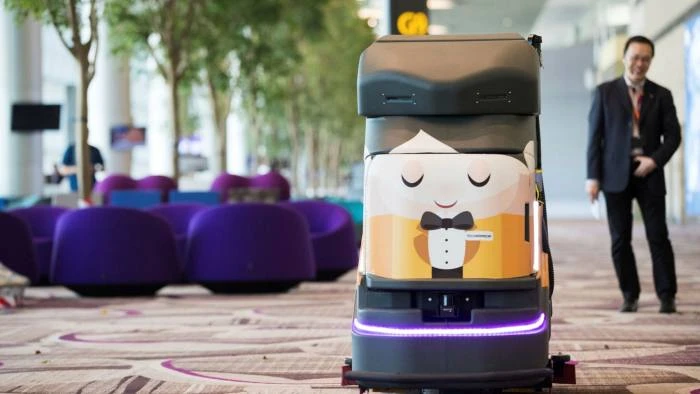
Artificial intelligence could shift south-east Asia's economy into a higher gear but only if countries manage to close a yawning investment gap that puts the bloc an estimated two to three years behind the US and China in adopting the technology, a new study says.
If members of the Association of Southeast Asian Nations pick up the pace in embracing AI, they could add nearly $1tn to the region's gross domestic product by 2030, according to a report released this month by US consultancy Kearney and Singapore's EDBI — the investment arm of the city-state's Economic Development Board.
But there is a long way to go.
In China, which has a much larger population, the figure for 2019 was $21.

The researchers surveyed more than 110 AI users, providers and investors, while interviewing representatives of more than 25 companies and government agencies across the region. They covered applications including machine learning, robotic process automation, smart robots, chatbots, virtual reality, computer vision and speech recognition.
Singapore stood out among its regional peers, with $68 worth of AI investment per capita last year. But Thailand, Malaysia, Indonesia, Vietnam and the Philippines all recorded less than $1.
Among the region's major economies, those last two countries were lagging far behind, with Vietnam at just 3 cents and the Philippines at less than 1 cent.
To an extent, this is natural. “Countries which are more networked and have a higher digital adoption will also have a higher base for adopting AI,” said Soon Ghee Chua, a partner at Kearney.
So if you compare, say, Singapore with Indonesia or Cambodia, “where the agriculture sector is relatively higher compared to the services sector, then obviously Singapore will be ahead in terms of AI adoption”, he said.
Based on Kearney's projections, AI could add $110bn to Singapore’s economy, or 18 per cent of its expected 2030 GDP.
For Malaysia, the firm forecasts a $115bn boost, or 14 per cent of GDP. Thailand stands to gain $117bn, or 13 per cent of GDP. Indonesia's projection of $366bn, Vietnam's $109bn and the Philippines’ $92bn would all work out to 12 per cent of each country's GDP.

But Nikolai Dobberstein, another partner at Kearney, flagged regulatory bottlenecks — privacy protection rules, issues of transparency and data-sharing restrictions — as challenges to adoption of the technology in south-east Asia.
“It's very important, I think, for companies and countries to engage regulators early,” he said. “I think regulators need to take a forward-looking approach and really balance out the risks. Therefore, having harmonised regulation across different Asean countries is important.”
Based on the survey, 83 per cent of the region is still in the early stages of AI adoption — defined as either not having an interest in investing in the technology, in the process of developing an AI strategy, or piloting initiatives in the field.
Even so, Kearney did identify bright spots where certain players are taking the lead. In Indonesia, online marketplace Tokopedia, which is backed by Japanese conglomerate SoftBank and Chinese internet giant Alibaba Group Holding, has used AI to adapt to changing customer behaviour.
Kearney noted that after implementing AI, the ecommerce company increased its total number of transactions by 202 per cent, with transactions per customer increasing up to 27 per cent and revenue jumping 179 per cent month on month.
In Thailand, the consultancy observed that Doctor Raksa, a telemedicine service that offers consultations with doctors through video platforms, tapped AI to assist physicians in performing preliminary diagnoses.
“With the rising wave of middle-class affluence coupled with rapid digital adoption, AI should yield good financial returns while creating disruptive capabilities to transform industries and stimulate economic growth with the next big breakthrough,” said EDBI chief executive Chu Swee Yeok.
In terms of sectors, Kearney said that manufacturing, retail and hospitality, as well as healthcare, were among those that would benefit the most from the growth of AI in south-east Asia.
The key is for countries to adapt AI to their own unique needs, according to Naveen Menon, president for Asean at American tech conglomerate Cisco Systems.
“It is important to have each country invest in capacity to develop their own algorithms and AI models, as opposed to importing global AI models and implementing them locally,” he said.
Kearney's Mr Dobberstein echoed this view, suggesting AI could not be adopted wholesale in the same way for all businesses. The focus, he said, should be on solving specific problems.
“What we have seen in how AI is being applied today — it's often seen as a panacea because there's so much business potential,” he said. “But it is not a panacea, it is not a cure. I think what comes out loud and clear is that you will need a razor-sharp focus on use cases and business impact.”





















